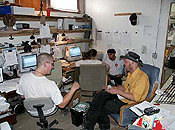GERLACH ADMINISTRATION/PRODUCTION SERVICES
Production Services is the business arm of the Department of Public Works (DPW), which is the largest user of purchased materials within the Burning Man project. Production Services provides bid research, purchasing, transportation-run coordination, rental coordination, receiving services, bookkeeping, office management, local public relations, and DPW departmental budgeting. In 2003, Production Services continued to mature as we streamlined our methodology and data tracking.
Within Production Services, the purchasing department has the difficult task of managing the acquisition of goods to build a city that houses more than 30,000 people. Lumber, equipment, and other material are required for major projects such as the Man, the Café, and the fence. Production Services coordinates the runners who travel through Nevada (and California if need be) to pick up everything from scrap metal to dish washing detergent—a huge task considering that runs are often required daily and that the event is in such a remote location. It is accountable to the Budget Committee and serves all departments within DPW as well as the Burning Man project at large. Purchasing agents are responsible for collecting material requests from project and department managers and finding sources that offer the best possible deals. The scope of departmental requests varies from heavy machinery, such as an 80-foot crane for lifting the Man, to items like cots for the Emergency Services Department. In addition, purchasing agents must also develop and maintain relationships with many of the vendors that provide the services that make life on the playa possible, such as the portable toilet and water truck companies.
 Our goal for the past several years has been to provide an accurate, real-time reflection of departmental expenditures so that managers would know how much of their budgets had been expended. This had been a difficult task because of the amount of paperwork generated and processed by the DPW purchasing department, all of which must be entered into QuickBooks. Until now, our system has been insufficient to the task.
Our goal for the past several years has been to provide an accurate, real-time reflection of departmental expenditures so that managers would know how much of their budgets had been expended. This had been a difficult task because of the amount of paperwork generated and processed by the DPW purchasing department, all of which must be entered into QuickBooks. Until now, our system has been insufficient to the task.
In the past, our purchasing system was entirely paper-based. The only way to track information (such as orders, vendors, etc.) was to go through the physical files. Year-end accounting was much more difficult as well because all purchases had to be coded by hand. This season, however, we were able adopt an electronic purchase order system. The new electronic PO system greatly simplified our accounting process as each item of a given purchase order was automatically associated with the appropriate budget line item.
However, the new system was not a complete success. We found that we were unable to keep up with the volume of data entry and cost verification needed to track that spending. Thankfully, we have begun the process of solving this problem. We will increase the number of computers that we use in the Gerlach office for purchase order data entry. We will also cross-train our staff so that more people can help if a big data-entry push is needed. In 2003, the new purchase order system worked pretty well considering that there was usually only one person entering and verifying data. Even though our data was not real-time, it was nearly real-time, and we were able to provide weekly spending reports to managers, although with the caveat that the reports probably wouldn’t include recent spending.
Although many managers were enthusiastic about having access to their spending information, others were confused or indifferent. The presentation of the data was dry and overly complex, and managers had not been trained properly in how to interpret it. Next year, we plan to start training earlier and to revise our reporting format to be more useful and accessible. We are also exploring various incentives that we can give managers to stay under their budgets. These changes along with more accurate reporting should help DPW cut spending in 2004.
 Once again, home base for Production Services was in the office in Gerlach, Nevada, and operationally speaking, things went smoothly. We did suffer some communications problems both with the phones and the Internet. There were insufficient phone outlets for the number of phones being used, so cords were frequently strung through the office. This inconvenient problem has already been solved thanks to our resident technical resources guru. New phone and network outlets have been installed throughout the office so that we will be able to more effectively host fluctuating number of workers that utilize the Gerlach office every year. Also, the office network has been upgraded, and we are looking into alternative Internet service providers. Bandwidth has always been a problem in the Gerlach office, curtailing the type of work we can do there.
Once again, home base for Production Services was in the office in Gerlach, Nevada, and operationally speaking, things went smoothly. We did suffer some communications problems both with the phones and the Internet. There were insufficient phone outlets for the number of phones being used, so cords were frequently strung through the office. This inconvenient problem has already been solved thanks to our resident technical resources guru. New phone and network outlets have been installed throughout the office so that we will be able to more effectively host fluctuating number of workers that utilize the Gerlach office every year. Also, the office network has been upgraded, and we are looking into alternative Internet service providers. Bandwidth has always been a problem in the Gerlach office, curtailing the type of work we can do there.
This year, we had some public workstations set up in the office that could be used for administrative projects or by project managers to conduct business online. While these computers were very useful, they were somewhat antiquated and lacked a full business suite of software applications, making them frustrating to use. Also, they were incompatible with the bookkeeping software we used and could not be used for data entry. The new systems we are building for general use should help alleviate these problems.
Overall, 2003 was a very successful year for DPW Production Services. We saw the implementation of an electronic purchase order system and consequently improved the accuracy and tracking of purchasing information. We were able to reduce double-ordering (a problem seemingly inherent to the old system) and now have an easily accessible purchasing history that will facilitate next year’s sourcing.
Submitted by,
Matt “HazMatt” Morgan

